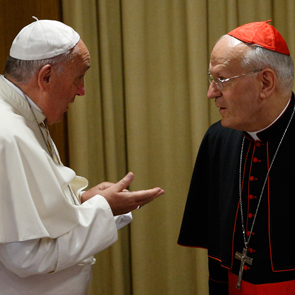A major shift in the Church’s pastoral care for gay Catholics was put forward at the Vatican’s Synod on the Family on Monday.
A document released at the halfway point of the gathering said that gay Catholics’ orientation should be valued and that they have “gifts and qualities” to offer parishes. The document also praised elements of same-sex partnerships.
“Are we capable of welcoming these people, guaranteeing them fraternal space in our communities? Often they wish to encounter a Church that offers them a welcoming home,” the document, presented this morning by Cardinal Peter Erdo, the relator general of the synod, stated. “Are our communities capable of providing that, accepting and valuing their sexual orientation, without compromising Catholic doctrine on family and matrimony?”
It goes on to explain that while there are “moral problems” with homosexual unions, "there are cases in which mutual aid to the point of sacrifice constitutes a precious support in the life of the partners".
The text also calls for the Church to recognise the “seeds of the Word that have spread beyond its visible and sacramental boundaries” to cohabiting couples, civil marriages and to Catholics who are divorced and remarried.
It adds that civil marriages and cohabiting relationships that have stability and deep affection and the responsibility of children, should be seen as “a germ to be accompanied in development towards the sacrament of marriage”.
This point reflects the law of graduality – the notion that an individual can come to the fullness of church teaching over the course of their lives – which has emerged as a theme at the synod.
On the question of Communion for divorced and remarried Catholics, the document makes clear that there has been disagreement between the Synod Fathers over the matter, and requests greater theological study on the matter.
It points out, however, that there are those who would like to see a re-admittance of Catholics in such circumstances to the Sacraments on a “case-by-case basis, according to a law of gradualness.” The document also stresses that divorced people who are not remarried, should receive Holy Communion as “nourishment”.
Throughout the text there is an emphasis on the Church accompanying people without passing judgement.
“Each damaged family first of all should be listened to with respect and love, becoming companions on the journey as Christ did with the disciples on the road to Emmaus,” it states.
On Humanae Vitae – Pope Paul VI’s encyclical that re-iterated the ban on artificial birth control – the document calls for an “appropriate teaching regarding natural methods”.
It stresses, however, the need to respect the “dignity of the person” when evaluating different methods of birth control.
Other concerns raised by the document include the need for better marriage preparation and the pressures on family life as a result of economic uncertainty and high taxation.
The document – known as the relatio – will form the framework for the synod discussions this week and will be used as the basis for this synod’s final text.
It was originally to be written by Cardinal Erdo and various officials but on Friday Pope Francis announced that six others, a number of whom he is close to, would help with its drafting. These included Cardinal Gianfranco Ravasi, President of the Pontifical Council for Culture; Archbishop Victor Manuel Fernández, rector of the Pontifical Catholic University of Argentina; and Fr Adolfo Nicolás, Superior General of the Jesuits.
At a briefing for journalists on the document, two Synod Fathers said the gathering of bishops had been imbued with the spirit of the Second Vatican Council.
Italian Archbishop Bruno Forte of Chieti-Vasto said the text released this morning was similar to Vatican II’s Gaudiem et Spes, which calls for the Church to respond “joys and hopes, the griefs and anxieties” of people. Filipino Cardinal Luis Antonio Tagle said the synod had experienced a slice of the Council’s spirit and defined this as a “dialogue with the world”.
Both Cardinal Tagle and Archbishop Forte stressed the importance of the presence of lay people at the synod and the need for laity to be part of discussions ahead of the ordinary synod which will take place from 4 to 25 October 2015.
Cardinal Tagle said: “It is part of the teaching of the spirit of Vatican II that, while the Church has one mission received from Jesus Christ, that mission is performed, shared and participated in by Christians who have received different gifts from the Holy Spirit, who find themselves in different states of life.”
Regarding the Church’s treatment of gay Catholics, Archbishop Forte re-iterated the inclusive language of the synod document.
“We must respect the dignity of every person; to be homosexual does not mean this dignity should not be recognised and promoted. The fundamental idea is the centrality of the person, regardless of the orientation,” he said.
He also pointed that people who are gay have “rights that should be protected”, and that this is an “issue of respect for those people”.
The document has already divided opinion. The British gay Catholic group Quest said the document marked “an acknowledgment that the Church is still in a process of discernment and that LGBT Catholics have a very key role to play in that process”. But Voice of the Family, a coaltion of pro-life groups, said it amounted to a “betrayal” of church teaching.
Above: Cardinal Erdo with Pope Francis at the synod. Photo: CNS




 Loading ...
Loading ...